|
 Secure Site
Secure Site
|
 |
Archive for the 'Zen Timepiece by Now & Zen' Category
 lovingkindness meditation Put it into practice.
Sit comfortably in a place where you won’t be disturbed. Take three to five quiet breaths. Gently close your eyes.
Imagine the horizon spanning through your chest with a radiant sun rising in your innermost center—your heart. As though being melted by the solar warmth, release tension in your shoulders and across your throat. Soften your forehead and rest your attention inward on the light deep within. Take 7 to 10 smooth, even breaths.
As you inhale, invite the glow from your heart to expand toward the inner surface of the body. With each exhale, let the light recede. Take another 7 to 10 peaceful breaths. Inhaling, invite the light to touch the parts of you that interact with the world—your eyes and ears, the voice center in your throat, the palms
of your hands, the soles of your feet. Exhaling, feel your light shine more clearly. As you continue to inhale and exhale, silently say: “I radiate friendliness for those who are happy, com-passion for those who are unhappy, equanimity toward all.” Continue until your attention wavers. Then, sit quietly for several minutes.
When you feel complete, place your palms together in front of your heart and bow your head. Release the backs of your hands to your thighs and lift your head. Gently open your eyes to return to the horizon of the world.
adapted from Yoga Journal, byKelly McGonigal
Use our unique “Zen Clock” which functions as a Yoga Timer. It features a long-resonating acoustic chime that brings your meditation or yoga session to a gradual close, preserving the environment of stillness while also acting as an effective time signal. Our Yoga Timer & Clock can be programmed to chime at the end of the meditation or yoga session or periodically throughout the session as a kind of sonic yantra. The beauty and functionality of the Zen Clock/Timer makes it a meditation tool that can actually help you “make time” for meditation in your life. Bring yourself back to balance.
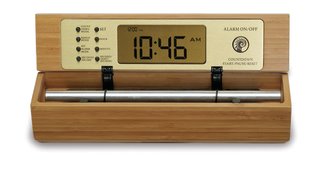 bamboo meditation timer Now & Zen – The Portable Meditation Timer Store
1638 Pearl Street
Boulder, CO 80302
(800) 779-6383
Posted in Bamboo Chime Clocks, intention, Meditation Timers, Meditation Tools, mindfulness practice, Now & Zen Alarm Clocks, Well-being, Zen Timepiece by Now & Zen, Zen Timers
 rest and relaxation You know a little too well what your kitchen looks like at 3 a.m. You’ve memorized the light patterns on your bedroom ceiling, counted thousands of sheep, and watched your Zen Alarm Clock for countless hours. And you’ve come to expect the thump of the newspaper at the front door a few minutes after 5.
If this sounds familiar, you’re in good company: Sixty-seven percent of American women surveyed in last year’s National Sleep Foundation poll said they regularly have trouble sleeping. Many of the culprits are hallmarks of our current culture: long work hours, stress, sugar-laden cappuccinos, wanting to fit too much into one day. Several recent reports, including a study published in Social Science & Medicine titled “Is Sleep Really for Sissies?,” have suggested that we value what we do during the day much more than what goes on at night.
But good sleep isn’t something we can afford to take off our to-do list. Like a nutritious diet and exercise, sleep is a foundation for health — not to mention sanity.
“It’s a bedrock,” says Paul Glovinsky, Ph.D., coauthor of “The Insomnia Answer.” As anyone with sleep trouble knows, a single bad night can hamper productivity, memory, even basic conversation skills. But it’s over time that insomnia really takes its toll. “We’ve seen that, in all kinds of ways, deficits accrue when you don’t sleep.”
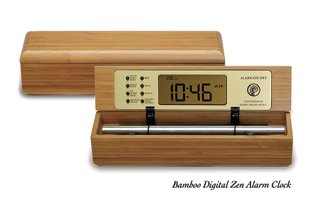 Bamboo Digital Chime Clock, for a progressive awakening Poor sleep may set you up for heart problems, for instance, plus lowered immunity, depression, diabetes, obesity, and chronic pain. One study actually proved that sleep deprivation can damage our mood in a very real way: Compared with those of rested people, the emotional centers of the brain in sleep-deprived people were 60 percent more reactive to negative experiences.
So what’s a droopy-eyed, overcaffeinated, dream-deficient woman to do? Committing to good sleep hygiene is a start. But it also pays to identify your unique sleep profile. There’s no single insomnia pattern; there are many. And delving into the details of yours can help you overcome it.
We went to several sleep experts with some common sleep types, like the person who can’t stop thinking, the one who wakes up at odd times, and the one who keeps finding excuses to push off bedtime (Really? Another episode of “House Hunters?”).
As it turns out, these patterns often have distinct causes and solutions. Don’t be surprised if more than one profile rings true; your patterns may fluctuate. The key is to give some serious thought to your sleep life. Use The Zen Timepiece with the Bowl /Gong to waken you. Try turing it around so that the digital display doesn’t show. The quality of your waking life — not to mention your health — depends on it.
Boulder, Colorado—an innovative company has taken one of life’s most unpleasant experiences (being startled awake by your alarm clock early Monday morning), and transformed it into something to actually look forward to. “The Zen Alarm Clock,” uses soothing acoustic chimes that awaken users gently and gradually, making waking up a real pleasure.
The luxurious awakening provided by the Zen Alarm Clock is part of the growing preference for things natural—natural foods, natural fibers, and now, natural acoustic sounds. Like organic tomatoes in your salad, the organic sounds of the Zen Alarm Clock’s sweet acoustic chimes are truly a gourmet experience.
What makes this gentle awakening experience so exquisite is the sound of the natural acoustic chime, which has been tuned to produce the same tones as the tuning forks used by musical therapists. According to the product’s inventor, Steve McIntosh, “once you experience this way of being gradually awakened with beautiful acoustic tones, no other alarm clock will ever do.”
Adapted from Body + Soul Magazine, May 2008 by Sarah Schmelling
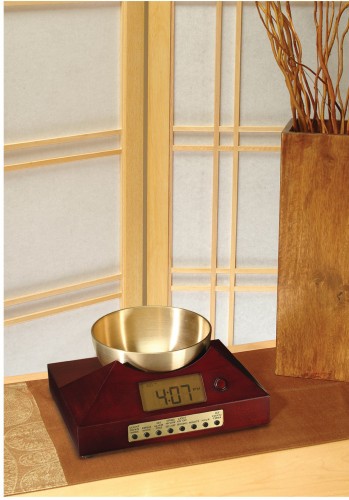 Zen Alarm Clock for a Gentle Awakening with a Bowl Gong and Mindfulness Timer Now & Zen’s Alarm Clock Shop
1638 Pearl Street
Boulder, CO 80302
(800) 779-6383
Posted in Bamboo Chime Clocks, Chime Alarm Clocks, Japanese Inspired Zen Clocks, Natural Awakening, Now & Zen Alarm Clocks, Progressive Awakening, Sleep Habits, Ukiyo-e, wabi-sabi, Well-being, Zen Timepiece by Now & Zen, Zen Timers
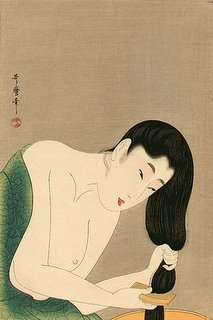 Utamaro Kitagawa, Bijin Combing Her Hair, 1750-1806 The key to create a wind-down period before bedtime is to create some space between your busy day and sleep time. “You can’t just work until 9 at night, and then stick your head on the pillow and fall asleep,” Khalsa says. So turn off the television, computer, and radio. Cut down on or eliminate evening classes and exercise that leaves you feeling amped up.
When you come home, honor this transition by playing relaxing music, lighting candles, or putting on your favorite pajamas and set your Zen Alarm Clock. Think of the yoga precept of pratyahara: Withdraw your senses in order to turn inward.
Our unique “Zen Clock” features a long-resonating acoustic chime that brings the meditation session to a gradual close, preserving the environment of stillness while also acting as an effective time signal.
adapted from yogajournal.com ‘Sweet Slumber’ by Nora Isaacs
 Zen Alarm Clock for a Gentle Awakening with a Bowl Gong
Now & Zen’s Chime Timer
1638 Pearl Street
Boulder, CO 80302
Posted in Bamboo Chime Clocks, Japanese Inspired Zen Clocks, Meditation Timers, Meditation Tools, mindfulness practice, Natural Awakening, Now & Zen Alarm Clocks, Progressive Awakening, Sleep Habits, Ukiyo-e, Well-being, Zen Timepiece by Now & Zen, Zen Timers
Just Breathe
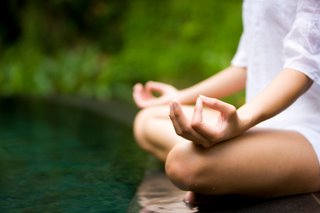 meditation, just breathe Find a comfortable seated position and begin by observing your natural breath. Notice the texture, length, and rhythm as the breath flows in and out of your body. Feel the temperature of the air as it touches your nostrils. Take note, too, of pauses between breaths.
As thoughts arise, note them, but then allow them to float by like clouds, gently bringing your attention back to the breath. If you find it difficult to concentrate, try silently counting. For example, inhale 1, exhale 1, inhale 2, exhale 2, up to 10, and then repeat the cycle. After a while, you can stop counting and just focus on your natural breath.
Although meditation can be done in almost any context, practitioners usually employ a quiet, tranquil space, a meditation cushion or bench, and some kind of timing device to time the meditation session. Ideally, the more these accoutrements can be integrated the better. Thus, it is conducive to a satisfying meditation practice to have a timer or clock that is tranquil and beautiful. Using a kitchen timer or beeper watch is less than ideal. And it was with these considerations in mind that we designed our digital Zen Alarm Clock and practice timer. This unique “Zen Clock” features a long-resonating acoustic chime that brings the meditation session to a gradual close, preserving the environment of stillness while also acting as an effective time signal. The Digital Zen Clock can be programmed to chime at the end of the meditation session or periodically throughout the session as a kind of sonic yantra. The beauty and functionality of the Zen Clock/Timer makes it a meditation tool that can actually help you “make time” for meditation in your life.
adapted from Yoga Journal, ‘Presence of Mind’ by Janice Gates
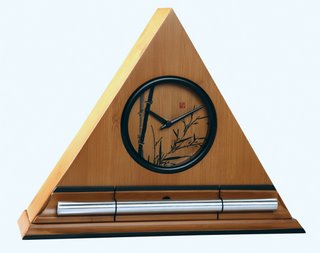 Zen Alarm Clock with Progressive Chime Now & Zen’s Mindfulness Timer Store
1638 Pearl Street
Boulder, CO 80302
Posted in Bamboo Chime Clocks, Chime Alarm Clocks, Japanese Inspired Zen Clocks, Meditation Timers, Meditation Tools, mindfulness practice, Natural Awakening, Now & Zen Alarm Clocks, Progressive Awakening, Yoga Timer, Yoga Timers by Now & Zen, Zen Timepiece by Now & Zen, Zen Timers
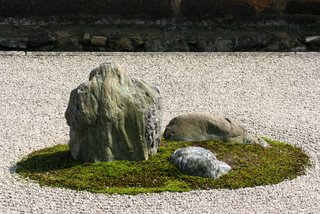 Ryoanji Zen Garden, Kyoto, Japan Steve McIntosh, Inventor of the Zen Clocks and Tehya (his wife) were most fortunate to visit the Ryoanji Zen Temple in Kyoto, Japan before their son, Peter McIntosh was born. It was a most peaceful and memorable trip. Below is a description of the ancient site:
Ryōan-ji is a Zen Temple located in northwest Kyoto, Japan. The garden consists of raked gravel and fifteen moss-covered boulders, which are placed so that, when looking at the garden from any angle (other than from above) only fourteen of the boulders are visible at one time. It is traditionally said that only through attaining enlightenment would one be able to view the fifteenth boulder.
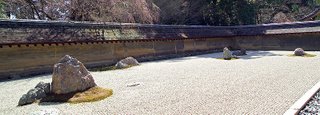 Ryōan-ji Japanese gardens are a living work of art in which the plants and trees are ever changing with the seasons. As they grow and mature, they are constantly sculpted to maintain and enhance the overall experience; hence, a Japanese garden is never the same and never really finished. The underlying structure of a Japanese garden is determined by the architecture; that is, the framework of enduring elements such as buildings, verandas and terraces, paths, tsukiyama (artificial hills), and stone compositions. Over time, it is only as good as the careful maintenance that it receives by those skilled in the art of training and pruning. Part of the art is to keep the garden almost static, like a painting.
 Ryōan-ji Temple Bell
Now & Zen Headquarter Store
1638 Pearl Street
Boulder, CO 80302
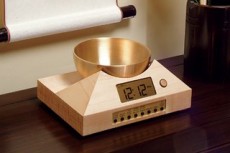 - Zen Timepiece Inspired by Ryōan-ji Temple Bell
The Zen Timepiece – a Gong Meditation Timer is the result of ten years of product evolution at Now & Zen, and we trust that you will find it a delight and a pleasure. The Zen Timepiece’s greatest beauty is in its sound.
Once you take a moment to adjust the strike force and position of the bowl/gong to your liking, your ears will be treated to the lovely tones of the bowl’s long-resonating ring. We recommend you set the clock so that the bowl is sounded in the lower end of its range, because this is where it sounds the sweetest.
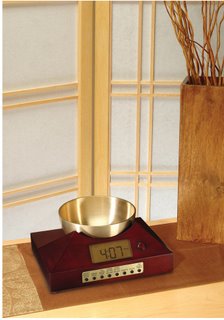 Gong & Chimes
Now & Zen’s Gong and Chime Store
1638 Pearl Street
Boulder, CO 80302
(800) 779-6383
Posted in Beauty, Chime Alarm Clocks, Japanese Inspired Zen Clocks, Meditation Timers, Meditation Tools, Now & Zen Alarm Clocks, Truth, Zen Gardens, zen monks, Zen Timepiece by Now & Zen, Zen Timers
 Soothe your little sweetie with a gentle massage Empirical research suggests our appreciation of massage starts early—as tastes go, it’s one that needs little acquiring. That’s certainly the message behind the growing trend of infant massage, where mothers and fathers (and sometimes caretakers) bond with their wee ones through loving touch and improve their overall health. Parents, nurses, and doctors say that massage helps babies grow better, improves digestion, and eases colic. Studies conducted at the Touch Research Institutes at the University of Miami School of Medicine show that infant massage facilitates weight gain in preterm infants, decreases babies’ level of stress hormones, and balances out their sleep/wake cycle. “Nurturing touch is important for children’s physical, social, behavioral, mental, and cognitive development,” says Linda Garofallou, an infant and pediatric massage therapist at Children’s Hospital in Newark, New Jersey. She gives infant massage to patients and also trains others in the technique.
To do an infant massage, choose a time when your baby is well fed and rested. Set your Zen Timer for twenty minutes. Put a towel in a quiet room for the baby to lie on, choose a natural oil such as coconut, almond, or avocado, and play relaxing music. Assess the baby’s receptivity by observing her response to your touch. If she is stiff or tense, then use your intuition: either hold her closely in your arms until she relaxes—or wait for another time. A gazing, quiet, yet alert state means she is ready to begin.
 Mom and baby A common stroke, called Indian Milking, entails holding one foot with your hand and then “milking” the leg from the ankle to thigh. Follow this by holding the thigh with both hands and gently twisting and squeezing your hands as you move from thigh to foot. (For more strokes, see Vimala Schneider’s classic book, Infant Massage: A Handbook for Loving Parents [Bantam, 1989] or visit the International Association of Infant Massage, www.iaim.ws/home.html, to find a certified infant massage instructor near you.)
Babes aren’t the only ones who benefit from infant massage. Experts like Andrea Kelly, ceo of the International Association of Infant Massage in Ventura, California say that giving a massage releases nurturing hormones for both the mother (oxytocin) and the father (prolactin).
In addition to bonding, infant massage helps kids born with addictions or serious health problems, says Joanne Starr, MD, director of pediatric cardiothoracic surgery at Children’s Hospital. She’s seen the positive effects of Garofallou’s infant massage on the tiny heart patients she’s operated on. “I think it’s a very important part of their healing,” says Starr, who adds that many of these infants can’t be held because they are hooked up to ventilators. “It’s such a helpless feeling for the parents, but massage empowers them to do something.”
adapted from Natural Solutions Magazine, October 2007
Although meditation can be done in almost any context, practitioners usually employ a quiet, tranquil space, a meditation cushion or bench, and some kind of timing device to time the meditation session. Ideally, the more these accoutrements can be integrated the better. Thus, it is conducive to a satisfying meditation practice to have a timer or clock that is tranquil and beautiful. Using a kitchen timer or beeper watch is less than ideal.
And it was with these considerations in mind that we designed our digital Zen Alarm Clock and practice timer. This unique “Zen Clock” features a long-resonating acoustic chime that brings the meditation session to a gradual close, preserving the environment of stillness while also acting as an effective time signal.
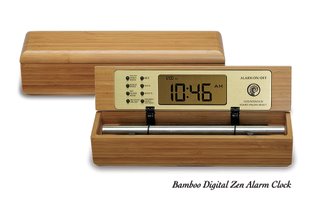 Bamboo Digital Chime Clock, a calming timer and alarm clock made from natural materials like bamboo, walnut, and maple Now & Zen – The Zen Timer Store
1638 Pearl Street
Boulder, CO 80302
(800) 779-6383
Posted in Bamboo Chime Clocks, mindfulness practice, Now & Zen Alarm Clocks, Well-being, Zen Timepiece by Now & Zen, Zen Timers
 Flower of Life The Zen Timepiece can also be more actively incorporated into your meditation practice as a form of “mantra” or “yantra.” Mantra is a sanskrit word which means “mental protection.” In Eastern meditation traditions, a mantra takes the form of a word or sound which is chanted to occupy the mind and keep disturbing thoughts from distracting the meditator. A yantra is used in Eastern meditation traditions as an image upon which the meditator concentrates until it “disappears.”
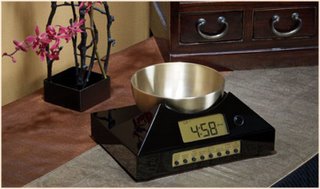 Zen Timepiece by Now & Zen, Boulder, CO The Zen Timepiece’s bowl strikes can be used as a sort of external mantra or sonic yantra. The clock’s countdown mode repeat function (the interval timer) allows the bowl to be struck repeatedly at any set period, so that as the strikes repeat, they serve to bring you back to the focal point of concentration.
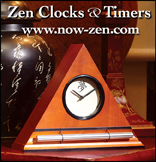 Now & Zen's Meditation Timers and Alarm Clocks Now & Zen’ s Meditation Timer Store
1638 Pearl Street
Boulder, CO 80302
(800) 779-6383
Posted in Chime Alarm Clocks, Meditation Timers, Meditation Tools, Now & Zen Alarm Clocks, Truth, Zen Timepiece by Now & Zen, Zen Timers
 meditation Put it into practice.
Sit comfortably in a place where you won’t be disturbed. Take three to five quiet breaths. Gently close your eyes.
Imagine the horizon spanning through your chest with a radiant sun rising in your innermost center—your heart. As though being melted by the solar warmth, release tension in your shoulders and across your throat. Soften your forehead and rest your attention inward on the light deep within. Take
7 to 10 smooth, even breaths. Set your Zen Meditation Timer to repeat and chime every 10 seconds to help you time your breathing.
As you inhale, invite the glow from your heart to expand toward the inner surface of the body. With each exhale, let the light recede. Take another 7 to 10 peaceful breaths. Inhaling, invite the light to touch the parts of you that interact with the world—your eyes and ears, the voice center in your throat, the palms
of your hands, the soles of your feet. Exhaling, feel your light shine more clearly. As you continue to inhale and exhale, silently say: “I radiate friendliness for those who are happy, com-passion for those who are unhappy, equanimity toward all.” Continue until your attention wavers. Then, sit quietly for several minutes.
When you feel complete, place your palms together in front of your heart and bow your head. Release the backs of your hands to your thighs and lift your head. Gently open your eyes to return to the horizon of the world.
adapted from Yoga Journal by Kate Vogt
 Zen timers for meditation and yoga Now & Zen – The Zen Meditation Timer Shop
1638 Pearl Street
Boulder, CO 80302
(800) 779-6383
Posted in intention, Meditation Timers, Meditation Tools, mindfulness practice, Well-being, zen, Zen Timepiece by Now & Zen, Zen Timers
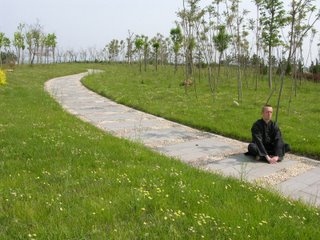 downtime I’m not great with downtime. In line at the post office, I whip out my cell phone and delete old text messages. When I’m stopped at a light, I retrieve a cloth from the glove compartment and dust the dashboard.
At home, I try to snuggle with my pug and relax, but I can’t. I get up to unload the dishwasher, check my e-mail, sort socks, or get a jump on tomorrow’s research and writing. Clearly, I feel better ticking items off my to-do list. The question is: Would I be better off just letting my mind drift?
Truth is, the urge to occupy idle time is tough to fight. We’re a nation of doers, after all: bustling workaholics who have a hard time sitting still (unless it’s in front of the TV). As much as we try to crowd it out, however, experts tell us that boredom is an essential part of the human experience. It’s a counterbalance to all that busyness. In fact, some argue it’s a gateway to peace.
“Create space in your life,” says Body+Soul life coach Cheryl Richardson, “and you’ll find serenity and inspiration on the other side.”
If a little thumb-twiddling can truly lead to better things, why do many of us so desperately avoid it? To demystify our aversion to idleness, we asked Richardson and psychotherapist Richard Winter, M.D., to explain what’s fueling our discomfort with those frightfully unscheduled moments. Here, they share the top three reasons we’re so down on downtime, as well as offer up ways to embrace it — and find deeper satisfaction in the everyday.
We’re Overstimulated
Remember when the doctor’s waiting room was just that — a place to sit, with nothing to do but wait? Now, with TV screens popping up in medical offices, taxicabs, elevators, and even the checkout line (not to mention the lure of your cell phone, iPod, and BlackBerry), every spare moment provides another opportunity for stimulation. As a result, the empty pockets of time we once took for granted have vanished.
 schedule downtime The problem with overstimulation, says Winter, author of “Still Bored in a Culture of Entertainment,” is it creates a “psychological callus” that hardens over time and can eventually keep us from responding with depth to anything or anyone. “Because we can’t discriminate between so many options, we completely shut down our attention to almost everything.”
That, he argues, essentially leaves us feeling passive and craving temporary relief from boredom. Worse, we end up with no time to reflect on our lives, making it harder to forge meaningful connections with the people around us.
Find joy in the humdrum. Recharge your inner resources by reacquainting yourself with quiet. This can prove surprisingly hard if you’re used to nonstop stimulation, so aim for specific actions. Turn off the TV after a certain time each evening. Drive one way of your commute without listening to NPR.
Better still, take a calming walk three nights a week after dinner — and leave the iPod home. The physical activity will satisfy your need to do something, all while energizing you in a way that watching Law & Order can’t. By welcoming a little idle time and its attendant reflection, says Winter, you’ll soon come to “delight in the ordinary again.”
adapted from Body + Soul October 2008
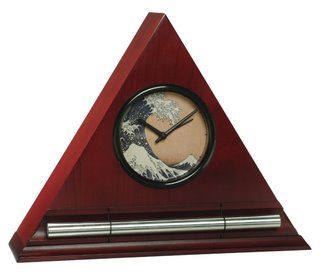 Zen Clock for Timing your downtime with a gentle chime Now & Zen’s Alarm Clock Shop
1638 Pearl Street
Boulder, CO 80302
(800) 779-6383
Posted in intention, Meditation Timers, Meditation Tools, mindfulness practice, nature, Now & Zen Alarm Clocks, Walking Meditation, Well-being, Zen Timepiece by Now & Zen, Zen Timers
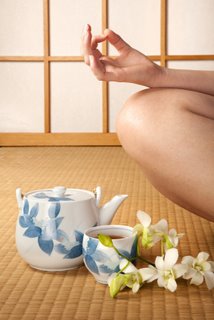 enjoy a meditative cup of tea A meditative act
Many tea drinkers say that drinking tea is not the sole purpose for the ceremony. At the Rocky Mountain Tea Festival, an annual summer event hosted by the Dushanbe Teahouse in Boulder, Colorado, tea professionals from around the country impart information on ceremonies and tea varieties. At the heart of every presentation is the message that the spirit of tea (chado) is intricately linked with simplicity and calmness.
Fellman, a busy woman who values the sense of well-being she derives from tea, strikes a happy medium between a to-go mentality and a traditional tea ceremony by preparing two spots in her home with an electric kettle, canisters of loose tea, and a cup or teapot. Selecting her spots carefully to provide “something nice to rest my eyes on that feels nourishing to me,” Fellman can enjoy a good cup of tea in twenty minutes. When brewing tea, Fellman listens to the water bubble and watches for steam. She looks carefully at the amount of tea used, breathes in the gentle fragrance of the leaves, and waits for the warmth of the teacup to pull the tension from her shoulders. “The mindful process of making a good cup of tea,” she says, “helps me take time to stop and focus.”
It’s no coincidence that elements of tea preparation are reminiscent of meditation. Buddhist monks served tea in places where a rogi, or path, had to be crossed in order to reach the tearoom and, in essence, leave the cares of the world behind. Today, tea drinkers focus on the art of brewing tea to separate themselves from daily concerns.
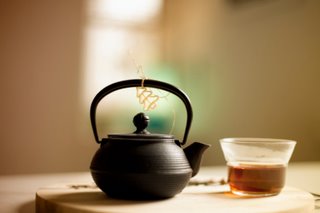 time for a meditative cup of tea Tea professionals suggest taking classes to learn the basic elements and history of the tea ceremony. “You can’t read a book and understand it,” says Austin Babcock, a member of the Washington, D.C., branch of the Urasenke Foundation, who likens tea ceremony education to mastering a martial art or learning to play an instrument. “It’s about getting it with your body. It’s an experience.” The Urasenke Foundation, a school of tea that offers classes worldwide, was founded by sixteenth-century tea master Sen no Rikyu, who is credited with establishing tea as a social and spiritual practice.
“There is a Zen quality” to tea ceremony, says Babcock. It creates “a calming, meditative space that allows you to open up your heart to another person. It is a powerful act of sharing . . . and of savoring the moment.”
adapted from Natural Home Magazine, September/October 2002 by Heather Grimshaw
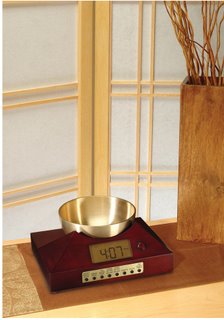 a Tibetan bowl/gong timer for timing tea Now & Zen’s Mindfulness Clock & Timer Store
1638 Pearl Street
Boulder, CO 80302
(800) 779-6383
Posted in intention, Meditation Timers, Meditation Tools, mindfulness practice, Zen Timepiece by Now & Zen, Zen Timers
« Previous Page — « Previous Entries
Next Entries » — Next Page »
|
|
|
|